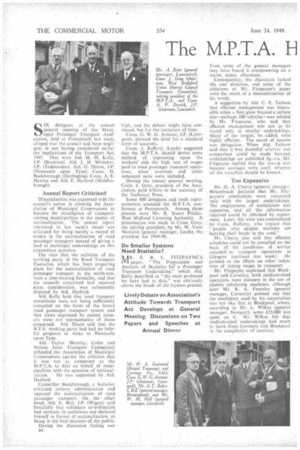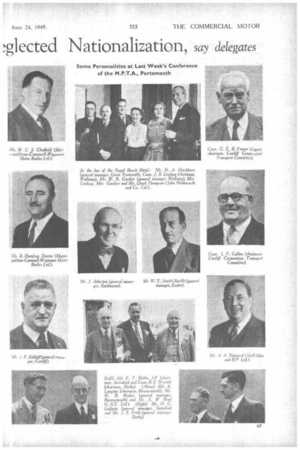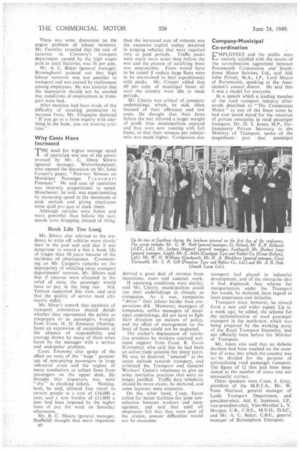The MET A H
Page 10

Page 11

Page 12

If you've noticed an error in this article please click here to report it so we can fix it.
):glected Nationalization, say delegates SIX delegates at the annual general meeting of the Municipal Passenger Transport Asserciation, held at Portsmouth last week, alleged that the council had been negligent in not having considered earlier the implications of the Transport Act, 1947. They were Aid. M. M. Kelly, J.P. (Stockton), Aid. J. H. Whitaker, J.P. (Todmorden), Aid. G. Dixon, J.P. (Newcastle upon Tyne), Conn. H. Buckborough (Darlington), Coun. A. E. Hawley and Aid. E. Harford (Middlesbrough).
Annual Report Criticized
Dissatisfaction was expressed with the council's action in allowing the Association of Municipal Corporations to become the mouthpiece of transportowning municipalities in the matter of nationalization.. The annual report (reviewed in last week's issue) was criticized for being merely a record of events in the nationalization of road passenger transport instead of giving a lead to munieipal undertakings on this contentious question. • The view that the activities of the working party of the Road Transport Executive, which has been preparing plans for the nationalization of road passenger transport in the north-east, were a time-wasting formality, and that the councils concerned had received -scant consideration, was vehemently disputed by Ald. Harford.
Aid. Kelly held that local transport committees were not being sufficiently consulted on the form of the future road passenger transportsystem and that views expressedby county councils were not representative of those concerned.. •Aid. Dixon said that the R.T.E. working party had had no helpful proposal to make to Newcastle upon Tyne.
Aid. Taylor (Burnley, Colne and Nelson Joint Transport Committee) defended the Association of Municipal Corporations against the criticism that it was not as competent as the M.P.T.A. to deal on behalf of municipalities with the question of national ization. He was supported by Aid. Harford.
Councillor Buckborough, a Socialist, criticized railway administration and opposed the nationalization of road passenger transport. On the other hand, Aid. E. Ball, J.P. (Wigan), said forcefully that voltintary co-ordination had outworn its usefulness and declared himself in favour, of nationalization. as being in the best interests of the public.
During the discussion feeling was n4 high, and the debate might have continued, but for the limitation of time.
Court. G. W. G. Armour, J.P. (Liverpool), stressed the need for a standard form of accounts.
Coun. J. Rafferty (Leeds) suggested that the M.P:T.A, should devise some method of. impressing upon the workers' side the high rate of wages paid to road passenger transport operatives, when overtime and other enhanced rates were included.
During the annual general meeting, Conn. J. Gray, president of the Association, paid tribute to the accuracy of the Technical Press.
Some 400 delegates and trade representatives attended the M.P.T.A. conference at Portsmouth. Among those present were Mr. R. Stuart Pitcher, West Midland Licensing Authority. A presentation was made to Coun. Gray, the retiring president, by Mr. W. Vane Morland (general manager, Leeds), the president for 1949-50.
Do Smaller Systems Need Statistics?
ARR. E. R. L. FITZPAYNE'S IVI paper, "The Preparation and Analysis of Statistics for a Passenger Transport Undertaking," which Aid. Kelly described as "the most profound we have had to date,"was obviously above the heads of the laymen present.
Even some of the general managers may have found it overpowering on a warm, sunny afternoon. .
Consequently, the discussion lacked life and direction, and some of the criticisms ot Mr.. Eitzpayne's paper were the result of a misconstruction of his words.
A suggestion by -Aid. C. E. Tatham that efficient management was impossible when a fleet grew beyond a certain size—perhaps 500 vehicles—was refuted by Mr. Eitzpayne, who Said that efficient management was not to be found only irt smaller undertakings. Many of the largest, he added, were highly efficient. The secret of success was delegation. When Ald. Tatham said that it 'was doubtful whether any comparison could be Made between undertakings on published fig ucs, Mr. Eitzpayne replied that the rem,nt was because averages were used. whereas all the variables should be known.
Too Expensive
Mr. G. A. Cherry (general manager, Birkenhead) declared that Mr. Fitzpayne's conclusions were ooncetned only with the largest undertakings. The employment of statisticians was expensive, and all the. information' could be obtained by experiment. Later, this view was contradicted by Coun. Rafferty, who 'argued that " people who despise statistics are burying theit heads in the sand."
Mr. Cherry also said that efficient schedules could not he compiled on the basis of the conditions of service awarded to transport operatives in Glasgow (outlined last week). He pointed to the effects on other industries of raising wages in transport.
Mr. Eitzpayne explained that Blackpool and Coventry, both medium-sized operators. were pioneers in the use of electric tabulating machines, although later Mr. R. A. Fearnley (general manager, Coventry) pointed out that the machinery used by his corporation was not like that at Blackpool, where, accOrding to Mr. L. Wilkes (general manager, Newport), some £25,000 was spent on it. Mr. Wilkes felt that medium-sized undertakings had much to learn from Coventry and Blackpool in the compilation of statistics. There was some discussion on the urgent problem of labour turnover. Mr. Fearntey revealed that the rate of turnover in Coventry's transport department, caused by the high wages paid in local factories, was 36 per cent.
Mr. A. C. Baker (general manager, Birmingham) pointed out that high labour turnover was not peculiar to transport and was caused by restlessness among employees. He was anxious that the impression should not be created that conditions of employment in transport were bad.
After mention had been made of the difficulty of securing permission to increase fares, Mr. Fitzpayne declared "If you go to a fares inquiry with anything in the bank, you are wasting your time."
Why Costs Have Increased
THE need for higher average speed of operation was one of the points stressed by Mr. C. Owen Silvers (general manager, Wolverhampton). who opened the discussion on Mr. John Cooper's paper, "Post-war Stresses on Municipal Passenger Tr a nsp or t Finances." He said cost of operation was inversely proportional to speed. Manchester, he said, was experimenting by increasing speed to the maximum at peak periods and giving employees some quid pro quo at slack times.
Although vehicles were _better and more powerful than before the war, speeds were dropping, instead of rising.
Book Life Too Long Mr. Silvers also referred to the tendency to write off vehicles more slowly' than in the past and said that it was dangerous to award a bus a book life of longer than 10 years because of the incidence of obsolescence. Commenting on Mr. Cooper's remarks on the impropriety of whittling away transport departments' reserves, Mr. Silvers said that if reserves were allocated to the relief of rates, the passenger would have to pay in the long run. Ald. Tatham supported this view, and said that the quality of service must ultimately suffer.
Mr. Silver's remark that members of transport committees should decide whether they represented the public as ratepayers or as passengers, brought from Coun. H. 0. Emmony (Nottingham) an expression of astonishment at the absence of responsibility and courage shown by many of them when faced by the manager with a serious and unpopular problem.
Coun. Emmony also spoke of the effect on costs of the "huge" percentage of non-paying passengers in large industrial areas and the neglect of many conductors to collect fares from passengers on the upper deck. He thought that inspectors, too, were
" shy " in checking tickets. Nottingham, he said, allowed free travel to certain people at a cost of £16,000 a year, and a new burden of £11,000 a year had been imposed by the higher rates of pay for work on Saturday afternoons.
Mr. R. C. Moore (general manager, Sheffield) thought that more important 86 than the increased cost of vehicles was the excessive capital outlay involved in keeping vehicles that were' required only at peak periods. Traffic peaks were much more acute than before the war and the process of satisfying them was uneconomic. Fares would have to be raised if unduly large fleets were to be maintained to deal expeditiously with peaks. Mr. Cooper added that 60 per cent. of municipal buses all over the country were idle at slack periods.
Mr. Cherry was critical of company undertakings, which, he said, often boasted of their efficiency. and low costs. He thought that their fares before the war allowed a larger margin of profit than municipalities enjoyed and they were now running with full buses, so that their revenue per vehiclemile was much higher. Companies also derived a great deal of revenue from excursions, tours and contract work.
If operating conditions were similar, said Mr. Cherry, municipalities could run their undertakings as cheaply as companies. As it was, companies "drove" their labour harder than corporations did. Moreover, managers of companies, unlike managers of municipal undertakings, did not have to fight their directors on matters of policy, and the effect of management on the level of fares could not be neglected.
The author's deprecation of restrictive practices by workers received welcome support from Coun. R. Eaves (Coventry), who said that he had been an active trade unionist for many years. He was, he declared, "amazed" at the union attitude towards transport, and criticized the Transport and General Workers' Union's reluctance to give up some restrictive practices that were no longer justified. Traffic duty schedules should be more elastic, he declared, and some layovers were excessive.
On the other hand, Conn. Eaves called for better facilities for joint consultation between workers and management, and said that 'until all employees felt that they were part of the system, present difficulties would not be overcome. Company-Municipal Co-ordination r MPLOYEES and the public were entirely satisfied with the results of the co-ordination agreement between Portsmouth Corporation and' Southdown Motor Services, Ltd., said Aid. John Privett, M.A., LP., Lord Mayor of Portsmouth, speaking at the Association's annual dinner. He said that it was a model for everyone.
In a speech which a leading member of the road transport industry afterwards described to "The Commercial Motor" as one of the finest cases he had ever heard stated for the retention of private enterprise in road passenger transport, Mr. D. T. Jones, M.P., Parliamentary Private Secretary to the Ministry of Transport, spoke -of the magnificenv part that municipal transport had played in industrial development, and of the enterprise •thet it had displayed. Any scheme for reorganization under the Transport Act would, he declared, have regard to local experience and initiative. .
• Transport must, hciwever, be viewed from a new and wider aspect. up to a week ago, he added, the scheme for the nationalization of road passenger transport in the north-east, which was being prepared by the working party of the Road Transport Executive, had not officially been before the Minister of Transport.
. Mr. Jones also said that no definite deciSion had been reached on the number of areas into which the country was to be divided for the purpose of nationalizing road passenger: transport. The figure of 12 that had been mentioned as the number of areas was not necessarily correct.
. Other speakers were Conn. J. Gray, president of the M.P:T.A., Mr. W. Vane Morland, general manager of Leeds Transport Department,. and president-elect, Aid. F. Jamieson, J.P., . vice-president-elect, Vice-Marshal L. V. Morgan, C.B., C.B.E.,. M.V.O., 1)-S.C., and Mr. A. C. Baker, C.B.E., general manager of Birmingham Transport.




























